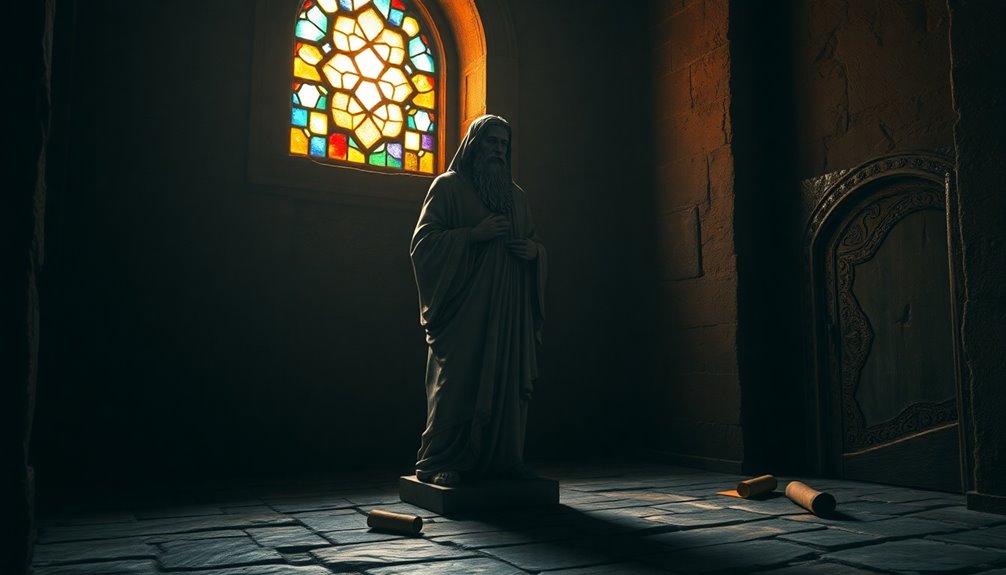Habakkuk is a unique prophet who speaks out during a time of chaos in Judah, questioning God about justice in the face of rampant injustice and idolatry. You'll find that his message emphasizes the tension between divine justice and human suffering, urging the faithful to "live by faith" even when circumstances seem dire. Habakkuk's conversations with God reveal a deeper understanding of reliance on divine promises amid turmoil. His profound insights resonate today, reminding you to trust in God's ultimate plan for restoration. Stick around, and you'll uncover more about his powerful themes and historical context.
Key Takeaways
- The Book of Habakkuk addresses the struggle of faith in the face of injustice and suffering during Judah's moral decay.
- Habakkuk uniquely questions God about the silence amidst suffering, engaging in a direct dialogue not seen in other prophetic writings.
- God reveals His plan to use Babylon to enact justice, challenging perceptions of divine righteousness during turbulent times.
- Key verses emphasize the importance of faithfulness, particularly Habakkuk 2:4, which states, "The righteous shall live by his faith."
- Community activities inspired by Habakkuk's themes include discussions, prayer meetings, and service projects addressing local injustices.
Introduction

The Book of Habakkuk stands out among the Twelve Minor Prophets for its raw exploration of faith amidst turmoil. As you delve into the text, you'll encounter the prophet Habakkuk grappling with profound questions about justice and divine sovereignty. Living during the rise of Babylon, he laments the rampant injustices plaguing Judah, struggling with the apparent silence of God in the face of human suffering.
Habakkuk's journey isn't just about questioning; it's about seeking understanding. He voices his frustrations, asking why God allows the wicked to prosper while the righteous suffer. This tension between divine justice and human suffering resonates deeply, inviting you to reflect on your own experiences of injustice and faith.
The prophet's laments reveal a profound struggle, yet they also lead to a transformative conclusion. Ultimately, Habakkuk affirms that living by faith is paramount, regardless of circumstances. His declaration emphasizes that the righteous must trust in God's ultimate justice, reminding you that even in chaos, there's a divine sovereignty at work.
As you explore this book, you'll find a powerful message about faith, resilience, and hope in the face of adversity.
Key Verses on Faithfulness

In Habakkuk, key verses highlight the importance of faithfulness in trying times.
You'll see how the prophet grapples with doubt while ultimately affirming trust in God's greater plans.
Let's explore these primary and secondary Bible references that illustrate this journey of faith.
Primary Bible References
Habakkuk's journey through doubt and despair reveals profound insights about faithfulness that resonate deeply with believers. In Habakkuk 1:2, you see the prophet grappling with God's silence amid injustice, questioning why He doesn't intervene in the suffering of His people.
Yet, in Habakkuk 1:5, God unveils His surprising plan, using the Babylonians as instruments of judgment, illustrating His sovereignty over nations.
The central theme emerges in Habakkuk 2:2-4, where you're encouraged to embrace the vision: "the righteous shall live by his faith." This emphasizes the necessity of faithfulness during adversity. Habakkuk's faith isn't passive; it's an active response to God's righteousness and judgment.
In Habakkuk 3:2, the prophet's prayer reflects reliance on God's past faithfulness, asking Him to remember His mercies. This deepens your understanding of hope.
Finally, Habakkuk 3:19 declares God as your source of strength, reinforcing the message of trusting in His faithfulness, no matter your circumstances. These key verses remind you that even in trials, faith anchors you in God's sovereignty and goodness.
Secondary Bible References
How can believers find strength in their faith when faced with uncertainty? The book of Habakkuk provides profound insights on maintaining faithfulness during times of suffering and injustice. In Habakkuk 2:4, we learn that "the righteous shall live by his faith," emphasizing that faith is essential for navigating life's challenges.
When the prophet questions God in Habakkuk 1:2 about the silence amidst suffering, it highlights your struggle to hold onto faith when confronted with injustice.
Habakkuk 3:2 serves as a powerful prayer, reminding you to recall God's past deeds, reinforcing trust in His mercy and power. This act of remembrance can be a source of strength.
Additionally, Habakkuk 1:5 reveals God's unexpected actions regarding nations, which encourages you to trust in His plans, even when they seem surprising.
Ultimately, the recurring theme of faithfulness in Habakkuk assures you that despite chaos, God's ultimate justice will prevail. Embracing this truth enables you to stand firm in faith, knowing that even in the face of adversity, God is working for your good.
Keep your faith alive, and rely on His unwavering righteousness.
Ancient Near Eastern Society

Ancient Near Eastern society thrived within a network of city-states, each ruled by a king who wielded significant political, religious, and economic power. This intricate system was marked by a polytheistic belief system, where you'd find various gods like Marduk and Ishtar at the center of daily life. Religious practices involved sacrifices and rituals, reflecting the community's devotion.
Agriculture formed the backbone of the economy. You'd see advanced irrigation techniques developed to support farming in the arid climate, leading to the growth of staple crops like barley and wheat. These crops were essential not only for sustenance but also for trade, as commerce flourished across the region.
Trade routes, such as the Royal Road, connected different cultures and facilitated the exchange of goods, ideas, and technologies. This interaction significantly influenced social dynamics and cultural exchanges across the Ancient Near East.
Additionally, legal systems like the Code of Hammurabi established laws governing social behavior and property rights, ensuring justice and order within these societies. Habakkuk's context is deeply embedded in this rich tapestry, highlighting how these societal structures shaped the lives of individuals in that era.
Cultural Context of Habakkuk

During a time marked by moral decay and social injustice in Judah, the Book of Habakkuk emerges as a powerful reflection of the cultural turmoil that the people faced. As the Babylonian invasion loomed around 586 BC, you can sense the anxiety and suffering that permeated society.
Habakkuk's prophetic writings address the tension between the apparent triumph of evil forces and the struggles of God's faithful people. In your exploration of Habakkuk's dialogue with God, you see a profound cultural struggle, where questioning divine justice becomes essential amid widespread corruption and violence.
The prophet's lamentation captures the essence of the emotional and spiritual battles faced during this tumultuous period. Moreover, Habakkuk's call for the righteous to "live by faith" serves as a rallying cry for resilience.
This cultural imperative encourages you to maintain hope even in the face of impending judgment and upheaval. The poetic elements within Habakkuk's writing echo the styles of ancient Near Eastern literature, grounding his message in the cultural context of his time.
Ultimately, Habakkuk's voice resonates as a timeless reminder of faith amidst suffering and injustice.
Habakkuk's Role as a Prophet

When you think about Habakkuk's role as a prophet, it's easy to overlook some common misunderstandings about his message.
Many people question the historical accuracy of his prophecies, but there's more to explore.
Let's unpack these issues and see how they shape our understanding of his significance.
Debunk Common Misunderstandings
Many people misunderstand Habakkuk's role as a prophet, thinking he merely delivers messages from God without any personal struggle.
In reality, Habakkuk openly questions God's decisions, grappling with the apparent lack of divine justice amid Judah's moral decay. This struggle, especially during the impending Babylonian invasion, showcases his unique prophetic role. He doesn't shy away from expressing doubt; instead, he engages in a heartfelt dialogue with God, illustrating that questioning is part of a faithful relationship.
Habakkuk's famous declaration, "the righteous shall live by his faith," highlights the theological implications of his message, emphasizing faith even in turbulent times.
His prophecies, structured around laments, divine responses about Babylon, and a concluding prayer, reflect a deep yearning for understanding and justice.
Historical Accuracy Concerns
Habakkuk's prophetic role emerges amid a backdrop of historical turmoil and moral decay, raising concerns about the accuracy and authenticity of his messages. As a prophet during the impending Babylonian invasion, likely between 610 and 605 BC, Habakkuk addresses the rampant injustice and idolatry in Judah. His unique dialogue format sets him apart from other prophets, as he openly questions God about justice and the suffering of His people. This direct engagement with the divine reflects the social turmoil of his time.
You might wonder how Habakkuk's messages hold up when considering the complexity of divine sovereignty. He reveals God's surprising plan to use Babylon as an instrument for justice, which can be hard to reconcile with the idea of a righteous God.
Yet, his emphasis on faith in the face of adversity offers a hopeful perspective. Habakkuk asserts that "the righteous shall live by his faith" (Habakkuk 2:4), reminding you that despite human suffering, God's ultimate plan for restoration remains intact.
This interplay of justice, faith, and righteousness invites you to reflect on the deeper meanings within Habakkuk's prophetic messages amid a chaotic historical context.
Faith in Difficult Circumstances

When you face personal adversity, it's easy to question your faith and sense of purpose.
Engaging in community faith-building activities can strengthen your resolve and connect you with others who share similar struggles.
Together, you can explore how to maintain trust in God's plan, even when times are tough.
Facing Personal Adversity With Faith
Facing personal adversity often leaves you grappling with questions and doubts, much like the prophet Habakkuk. In his lament, he boldly questioned God's silence amid injustice and suffering, reflecting your own struggles.
It's crucial to express these doubts during tough times, as Habakkuk teaches us. His journey emphasizes that faith flourishes even in adversity. When he states, "The righteous shall live by his faith," he highlights the importance of relying on divine promises, reminding you that you're not alone.
As you face challenges, remember Habakkuk 3:19, where he declares God as his source of strength. This can empower you to stand firm in your faith despite your circumstances.
The process of questioning leads to deeper understanding and transformation, as Habakkuk found clarity in his dialogue with God.
Ultimately, Habakkuk's final prayer illustrates a powerful shift from despair to hope. It's a reminder that while adversity may feel overwhelming, trust in God's justice and deliverance can guide you through.
Embrace your faith, knowing that it can light the path toward healing and resilience, just as it did for Habakkuk.
Community Faith-Building Activities
Engaging in community faith-building activities can significantly strengthen your resolve during difficult times. By participating in group discussions centered on Habakkuk's themes of faith and justice, you foster a shared environment for reflection on God's promises.
Organizing prayer meetings based on Habakkuk 3:2 allows you to collectively remember God's past deeds and mercy, reinforcing communal faith.
Involving yourself in service projects that tackle local injustices embodies the prophetic call of Habakkuk, enabling you to live your faith practically amidst adversity. These acts of service not only promote justice but also build resilience within your community.
Hosting workshops focused on Habakkuk 2:4 emphasizes the importance of living by faith, equipping you and others to face challenges with strength.
Additionally, creating art or music inspired by the Book of Habakkuk offers a therapeutic outlet for expressing hope and faith. Such creative expressions can unite your community, solidifying a collective identity rooted in trust, even when circumstances are tough.
Through these activities, you cultivate a supportive network that empowers each member to navigate difficulties with renewed hope and resilience.
Final Thoughts on Habakkuk

Three key themes emerge from the Book of Habakkuk that resonate deeply with anyone grappling with faith amid uncertainty.
First, Habakkuk's journey illustrates the importance of lamenting human suffering. You're not alone in questioning God during tough times; Habakkuk models respectful dialogue, showing you can express doubts while seeking understanding.
Second, the theme of divine justice stands out. As you navigate life's challenges, remember that God's sovereignty prevails. The book reassures you that even when judgment seems delayed, God is aware of all injustices. Your faith can anchor you as you trust in His ultimate plans.
Lastly, Habakkuk emphasizes the necessity of living by faith. Habakkuk 2:4 reminds you that "the righteous shall live by his faith." This call to trust God, even when circumstances are bleak, reinforces the strength found in unwavering belief.
The concluding prayer beautifully encapsulates these themes, urging you to reflect on God's past deeds while hoping for future justice.
In the end, Habakkuk inspires you to cling to faith, trusting in God's sovereignty amid life's uncertainties.
Additional Resources

Exploring the Book of Habakkuk becomes even more enriching with the right resources. One excellent place to start is BibleGateway, which offers access to 226 Bible versions in 71 languages. This variety allows you to engage in a comparative study, deepening your understanding of Habakkuk's themes and messages.
You might also consider diving into recommended readings like "Nahum, Habakkuk, Zephaniah" by David W. Baker and "The Books of Nahum, Habakkuk, and Zephaniah" by O. Palmer Robertson, which provide essential theological insights.
For a more interactive experience, check out podcasts that discuss biblical justice and videos that explore covenants, enhancing your comprehension of Habakkuk's context.
Don't overlook community resources, either. You can find free downloadable overviews and MP4 videos about Habakkuk, promoting collaborative learning and discussion.
Additionally, scholars like Achtemeier, Andersen, and Bruce have written extensively on Habakkuk, offering valuable historical analysis and literary critique. These resources will undoubtedly enrich your study and appreciation of this profound book.
To further enhance your learning, consider utilizing audience engagement strategies that can help you discuss Habakkuk's themes with others effectively.
Frequently Asked Questions
What Is the Main Message of Habakkuk?
You'll find that the main message revolves around the struggle between faith and doubt in the face of injustice.
It challenges you to question why suffering exists while emphasizing the necessity of trusting in a higher purpose.
Ultimately, it encourages you to live by faith, asserting that despite life's trials, you'll find strength through your belief in a just and sovereign power, which assures you of hope and future restoration.
What Is Habakkuk Most Known For?
You might find that Habakkuk is most known for his profound dialogue with God, where he boldly questions the presence of injustice and suffering among his people.
His striking literary style, filled with vivid imagery and emotional depth, resonates with many.
You'll notice that his faith shines through, especially in the declaration that "the righteous shall live by faith," emphasizing the importance of trust in God amidst turmoil and uncertainty.
What Is the Book of Habakkuk About?
The book explores profound themes of justice and faith.
You'll find a dialogue between the prophet and God, where you question divine silence amid suffering.
It addresses the impending threat of a powerful nation and reveals God's plans for justice.
As you read, you'll encounter powerful affirmations of faith, emphasizing the importance of living righteously despite challenges.
Ultimately, it's a journey of grappling with doubt and reaffirming trust in God's sovereignty.
What Was God's Promise to Habakkuk?
God's promise emphasizes the importance of writing down your vision clearly so you can understand and fulfill it at the right time.
He reassures you that even when faced with injustice, the righteous will live by faith.
Despite the temporary triumph of the wicked, God guarantees that justice will prevail in due time.
Trusting in His sovereignty brings strength and victory, reminding you of His faithfulness through every challenge you encounter.










